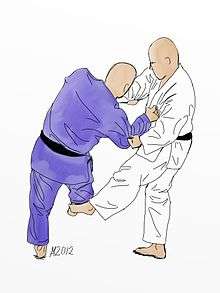Deashi harai
| Deashi harai | |
|---|---|
|
Illustration of De-ashi-barai Judo throw | |
| Classification | Nage-waza |
| Sub classification | Ashi-waza |
| Kodokan | Yes |
| Technique name | |
| Rōmaji | Deashi-harai, De-ashi-barai |
| Japanese | 出足払 |
| English | Advanced foot sweep[1] |
| Korean | 나오는 발차기 |
Deashi Harai (出足払), more accurately romanized: Deashibarai, is one of the original 40 throws of Judo as developed by Jigoro Kano. It belongs to the first group, Dai-Ikkyo, of the traditional throwing list, Gokyo-no-Nagewaza, of Kodokan Judo. It is also part of the current 67 Throws of Kodokan Judo.[2] It is classified as a foot technique, Ashi-Waza. Deashi Harai is also one of the 20 techniques in Danzan Ryu's (DZR) Nagete list.
Description
Deashi Harai is one of the basic foot sweeps learned in the martial arts. As with most basic techniques, Deashi Harai has more variations than can be described here.
One common method used in Danzan-ryu Jujitsu is the outside-in method of sweeping an opponent's foot. It is accomplished by initially having a firm grip on the opponent while facing him or her. The attacker then moves the foot to the opposite side of his opponent (right foot to opponent's left side, or vice versa), to sweep the opponent's opposite leg out from underneath him. Simultaneously the upper body must complement this push-pull motion with a great deal of power being generated from the rotation of the hips.
See also
References
- Ohlenkamp, Neil (2006) Judo Unleashed basic reference on judo. ISBN 0-07-147534-6.
- ↑ http://www.judoinfo.com/images/animations/blue/deashibarai.htm
- ↑ Mifune, Kyuzo: The Canon of Judo, Kodansha International Ltd. (Tokyo) 2004, ISBN 4-7700-2979-9, p.pp. 46–47
Further reading
- Sato, Nobuyuki (1992), "Ashiwaza", Judo Masterclass Techniques (second ed.), Ippon Books, ISBN 0-9518455-5-1
External links
- "JudoInfo.com" Animations and drawings
